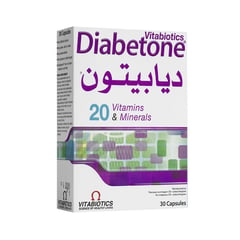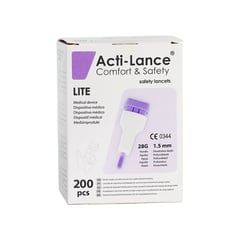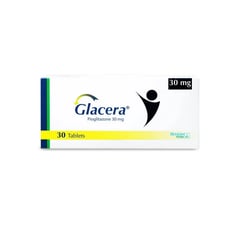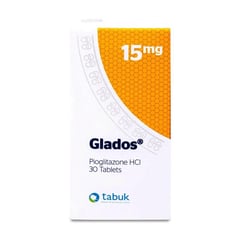Glados 30 Mg 30 Tablets
71.30

In stock
SKU :
1033-TB183
It is used to lower blood sugar levels in patients with diabetes mellitus type 2
What is Pioglitazone hydrochloride and what is used for:
Pioglitazone hydrochloride is a medication that belongs to a class of medications known as “thiazolidinediones”.
It is used for the treatment of adult patients with type 2 diabetes mellitus (high blood glucose levels due to insulin resistance) as an adjunct therapy to diet and exercise to help improve the glycemic control.
Do not take Pioglitazone hydrochloride:
If you are allergic to Pioglitazone hydrochloride, or any of the ingredients in this medicine.
Tell your doctor about the allergy and what signs you had.
if you are diagnosed with NYHA Class III or IV heart failure (advanced stages of heart failure which is a disorder that causes your heart muscle to lose its ability to pump blood properly).
Warnings & Precautions:
Talk to your doctor or pharmacist if you develop allergic reactions such as shortness of breath, skin rash, swelling of the face or neck, decreased blood pressure and dizziness.
This medicine may cause fluid retention which can worsen or lead to heart failure.
The risk of fluid retention was shown to be higher in patients who are using insulin in combination with this medicine and suffer from congestive heart failure NYHA Class I and II (first classes of heart failure; NYHA Class I means that you have no symptoms and no limitation in ordinary physical activity like shortness of breath when climbing stairs or walking; Class II means that you experience mild symptoms like mild chest pain or shortness of breath and mild limitation during normal physical activity).
Make sure to talk to your doctor before starting this medicine if you have heart problems (e.g. heart failure).
Talk to your doctor if you develop signs of heart failure while taking this medicine like, swelling of the feet, ankles or abdomen, weight gain, fatigue upon exertion, difficulty breathing and irregular heart rhythms.
This medicine may cause edema (swelling) that is dose-related. If this happens, make sure to tell your doctor about it. Your doctor may reduce the dose if needed.
This medicine may be linked to liver problems that can be fatal.
If your doctor suspects a liver injury, he/she will make sure to stop the medicine immediately and will assess you for the real cause behind your liver damage.
This medicine should not be restarted if the doctor was not able to identify another possible cause for the liver damage.
Your doctor may recommend liver blood tests if you have liver problems and will decide accordingly if any dose adjustments are needed.
This medicine may increase the risk of fractures in female patients.
This medicine may cause an increased risk of bladder cancer especially when used for a prolonged period of time.
Make sure to tell your doctor if you have bladder cancer or if you previously had bladder cancer.
You should not take this medicine if you have bladder cancer.
This medicine may cause hypoglycemia (low blood glucose levels) when given with insulin or an insulin secretagogue.
Your doctor may recommend a lower dose of the insulin or insulin secretagogue to prevent hypoglycemia.
Talk to your doctor if you experience signs of hypoglycemia like shaking, tremors, palpitations, sweating and dizziness.
High blood glucose levels may cause macular edema (eye edema).
It is recommended that you do regular eye check-ups at your doctor’s office.
This medicine was not shown to decrease the risk of macrovascular outcomes (e.g. heart, kidney, eye, brain and nerves complications).
Talk to your doctor before taking this medicine if you have liver problems, heart failure, type 1 diabetes (juvenile diabetes) or diabetic ketoacidosis.
Your doctor should do some blood tests including HbA1c (used to assess your glycemic control) before you start taking pioglitazone.
Talk to your doctor before taking this medicine if you are a premenopausal woman (woman of childbearing potential).
This medicine may increase ovulation which may increase the chance of pregnancy.
Ask your doctor for contraceptive methods (birth control) that you can use to prevent pregnancy when taking this medication.
Make sure to tell your doctor immediately if you get pregnant when taking this medicine.
Possible Side Effects:
Possible side effects include signs of an allergic reaction, like rash and itching; red, signs of heart failure like, swelling of the feet, ankles or abdomen, weight gain, fatigue upon exertion, difficulty breathing and irregular heart rhythms, signs of liver problems like, stomach pain, nausea or vomiting, unusual or unexplained tiredness, dark urine, yellowing of your skin or the whites of your eyes and loss of appetite, edema and weight gain, fractures, bladder cancer, hypoglycemia (when given with insulin or other diabetes medicines), signs of macular edema like, vision changes. Other possible side effects include upper respiratory tract infection, infection of the sinuses, headache, muscle pain, sore throat, laboratory abnormalities, ovulation and increased risk of pregnancy.
Other medicines and Pioglitazone hydrochloride:
Tell your doctor or pharmacist if you are taking, have recently taken or might take any other medications including prescription medicines, over the counter medicines (do not require a prescription), herbals, vitamins and supplements.
If you are taking gemfibrozil (used to treat high triglycerides level).
If you are taking rifampin (antibiotic). How to take Pioglitazone hydrochloride:
Adults
Recommended initial dose is 15 mg or 30 mg orally once daily.
Starting dose should not exceed 15 mg once daily in patients with NYHA Class I or II heart failure.
Your doctor may increase the dose by increments of 15 mg if glycemic control is not reached (depending on your HbA1c level).
Maximum dose is 45 mg.
Children
Effectiveness and safety of this medicine have not been established in children yet.
How To Use:
Make sure to take your medication as prescribed by your doctor.
Your doctor will tell you how much to take of this medication and may change doses depending on your response to the medication and other medicines that you are taking.
Your doctor may recommend additional diabetes medicines to take along with pioglitazone.
Take tablet with or without food.
Swallow tablet whole with a full glass of water.
Take tablet at the same time every day.
If you are under stress (e.g. infection, accident, fever or surgery), make sure to talk to your doctor immediately.
Your doctor may change the dose of your diabetes medicines if needed.
It may take around 2 to 3 months for glycemic control to be reached.
Make sure to follow a healthy diet and exercise program as recommended by your healthcare provider and get your blood sugar levels checked on a regular basis while taking pioglitazone.
How to store Pioglitazone hydrochloride:
Store medication at 15 to 30 °C.
Keep out of the reach of children and pets
Do not use beyond the expiry date mentioned on the box
Keep medication in its original pack to protect it from moisture and light
Do not use damaged pills
Do not dispose medication in the wastewater or household waste
| Shipping Type | Express |
|---|
Write Your Own Review
The largest selection of casino games and sports bets at 1xbet app.








